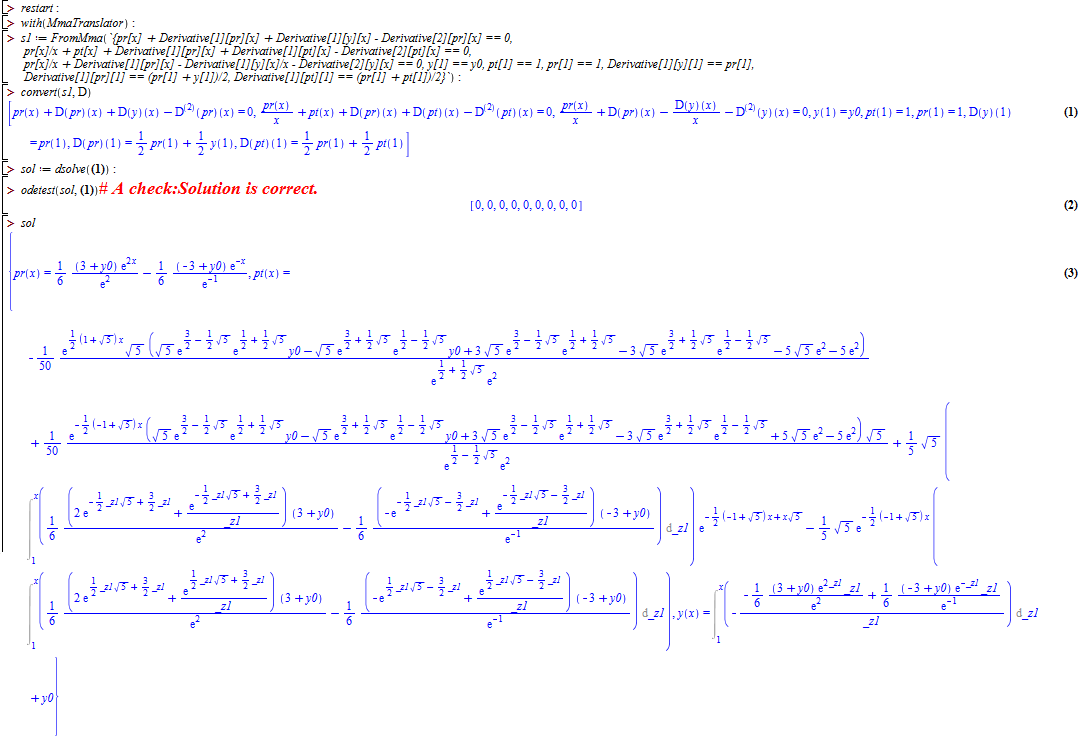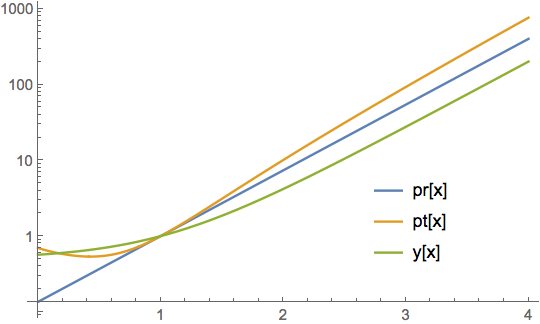I am trying to solve the following three coupled ODEs with six boundary conditions:
deq = {pr[x] + a y'[x] + b pr'[x] - c pr''[x] == 0,
e pt[x] + e2 pr'[x] + l pt'[x] + b2 pr[x]/x - dd pt''[x] == 0,
v0 pr'[x] + v0 pr[x]/x - dd y'[x]/x - dd y''[x] == 0, y[L] == y0,
pt[L] == pt0, pr[L] == pr0, y'[L] == v0 pr[L]/dd,
pr'[L] == (pr[L] + v0 y[L])/(2 dd),
pt'[L] == v0 (b2 pr[L] + e pt[L])/(2 dd)} /.
Thread[Rule[{a, b, c, e, e2, l, b2, dd, L, pt0, pr0, v0}, ConstantArray[1, 12]]];
DSolve[deq, {pr, pt, y}, x]
but there is no meaningful output. Could anyone help me to solve the equations? What is wrong in my code?
I don't get solutions to the equations even when I put constants equal to 1:
L = 5;
deq = {pr[x] + y'[x] + pr'[x] - pr''[x] == 0,
pt[x] + pr'[x] + l pt'[x] + pr[x]/x - pt''[x] == 0,
pr'[x] + pr[x]/x - y'[x]/x - y''[x] == 0, y[L] == y0,
pt[L] == pt0, pr[L] == pr0, y'[L] == pr[L],
pr'[L] == (pr[L] + y[L]), pt'[L] == pr[L] + pt[L]} /.
Thread[Rule[{a, b, c, e, e2, l, b2, dd, L, pt0, pr0, v0}, ConstantArray[1, 12]]];
DSolve[deq, {pr, pt, y}, x]
I tried the first answer as below:
L = 5;
DI = 1;
f = 1;
g = 1;
ff = 1;
fff = 1;
fo = 1;
gg = 1;
DD = 1;
Y0 = 1;
pt0 = Cos[Pi/6];
pr0 = Sin[Pi/6];
deq = {pr[x] + g y'[x] + gg pr'[x] - DD pr''[x] == 0,
pt[x] + f pr'[x] + ff pt'[x] + fff pr[x]/x - fo pt''[x] == 0,
v0 pr'[x] + v0 pr[x]/x - DI y'[x]/x - DI y''[x] == 0, y[L] == Y0,
pt[L] == pt0, pr[L] == pr0, y'[L] == v0 pr[L]/DI,
pr'[L] == (pr[L] + y[L]), pt'[L] == pr[L] + pt[L]} /.
Thread[Rule[{a, b, c, e, e2, l, b2, dd, L, pt0, pr0, v0, y0},
ConstantArray[1, 13]]];
sol = NDSolve[deq, {pr, pt, y}, {x, 10^-6, 4}];
Plot[Evaluate[{pr[x], pt[x], y[x]} /. sol], {x, 0, 5}, PlotLegends -> Placed[{"pr[x]", "pt[x]", "y[x]"}, {.75, .3}]]
but the output graph shows that pt and pr are not equal to boundary condition at x=l.


